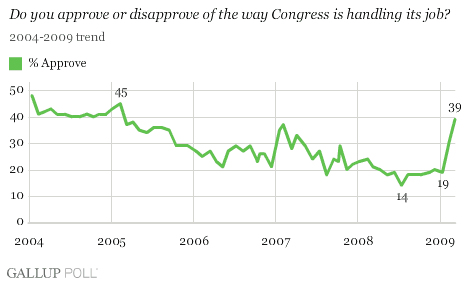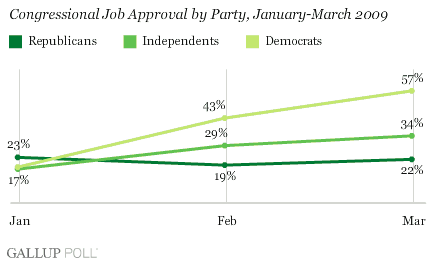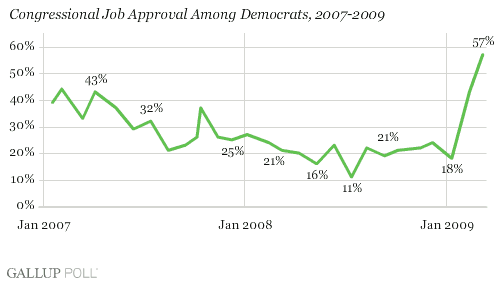PRINCETON, NJ -- Americans' job approval rating of Congress is up an additional 8 points this month, after a 12-point increase last month, and now stands at 39% -- the most positive assessment of Congress since February 2005.

Americans who identify themselves as Democrats are mostly responsible for the improved ratings of Congress measured in the March 5-8 Gallup Poll. After showing a 25-point increase in their approval of Congress from January to February and a further 14-point increase in March, a majority of Democrats (57%) now approve of the job the Democratically-controlled Congress is doing. Independents also show improved ratings of Congress, but not nearly to the extent that Democrats do. Republicans' evaluations of Congress have changed very little this year.

Quick Turnaround
Even though Congress' job approval rating is still low on an absolute basis, the recent ratings represent a quick turnaround from the historically low ratings of 2008. Last year, on average, only 19% of Americans approved of the job Congress was doing -- one of the three lowest yearly congressional approval averages in Gallup records dating back to 1974, along with 1979 (19%) and 1992 (18%).
In January of this year, Congress' job approval rating among remained low at 19%, before jumping to 31% in February after the change in presidential administrations from Republican George W. Bush to Democrat Barack Obama. But this month brings an even more positive evaluation of Congress, with 39% of Americans now approving.
The latest increase suggests the reason for the improved ratings of Congress in 2009 may go beyond simply the change from split control to one-party control of the federal government, to include an assessment of the work Congress has been doing with the new president on the economy and other issues.
Such an explanation seems plausible given that a majority of Democrats now approve of the job Congress is doing, and that the gap between Democratic and Republican approval of Congress is growing, as Congress passes and President Obama signs laws to deal with the economy and other issues that largely follow a Democratic philosophy of governing.
Even though the Democratic Party had majority control of both houses of Congress in 2007-2008, it was able to achieve little of its legislative agenda while Republican Bush remained in the White House. This lack of results may have soured Democrats' opinions of Congress. During this time, rank-and-file Democrats' approval ratings of Congress sank to as low as 11% in July 2008, after starting out near 40% shortly after the party took control of Congress in early 2007.

Now that the strengthened Democratic-controlled Congress is able to pass most of what it wants with little or no help from Republicans, and can count on the president to sign it into law, rank-and-file Democrats hold Congress in much greater esteem. The 57% approval rating for Congress among Democrats is the best the party has given the institution since March 2002, when Congress' job approval scores were at historical highs in the aftermath of the Sept. 11 terrorist attacks.
Survey Methods
Results are based on telephone interviews with 1,012 national adults, aged 18 and older, conducted March 5-8, 2009. For results based on the total sample of national adults, one can say with 95% confidence that the maximum margin of sampling error is ±3 percentage points.
Interviews are conducted with respondents on land-line telephones (for respondents with a land-line telephone) and cellular phones (for respondents who are cell-phone only).
In addition to sampling error, question wording and practical difficulties in conducting surveys can introduce error or bias into the findings of public opinion polls.
